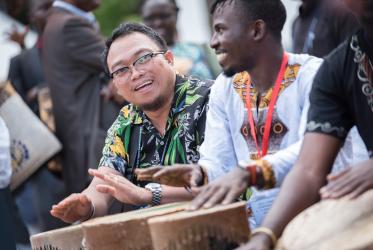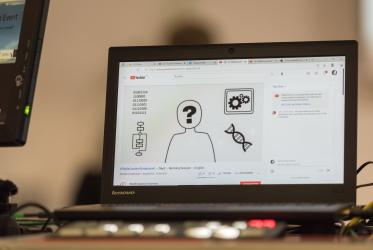Rev. Prof. Dr Benjamin Simon, World Council of Churches programme executive for Ecumenical Theological Education, explained that the core group is at the beginning stages of planning a future online platform related to pedagogy.
“As we considered the challenges theological students and faculties faced during COVID-19, we now are looking at how we can emerge from and transform that experience into re-conceptualizing the aim of and access to theological education,” explained Simon. “We will move forward with care, knowing that some communities do not always have online access.”
But online access has the potential to increase for those who cannot travel or physically attend educational institutions in person, Simon noted. “Persons with disabilities, persons without resources for travel, women who are struggling to get a theological education in countries that throw obstacles in the way—all these groups could benefit from an online platform through which they can come together,” he said. “It’s not a replacement for in-person education—but an enhancement, and a potentially transformative one at that.”
Marina Ngursangzeli Behera, from The Oxford Centre for Mission Studies, serves with the core consultative group.
“Long before the pandemic, online teaching has been there, also in theology,” Behera noted. “There were concerns like the question of the possible contextuality of such teaching and learning when offered on a de-territorialised digital realm.”
Behera further noted that, even before COVID-19, it seemed to have been self-understood that a qualitative theological training which includes counselling and spiritual formation could not be done online.
“The lockdown regulations to fight the pandemic have forced many schools into online-based teaching,” she said. “Going digital, they became aware that also onsite teaching and learning has for many a de-territorialising effect.”
As Behera and others spoke with faculty, staff, and students about their experiences doing COVID-19, they heard many stories of how they supported each other—which meant counselling and spiritual formation had indeed been practised online
“An online platform will offer the opportunity to share experiences and learnings as well as concepts, materials, and personnel,” explained Behera. “This will positively impact online teaching and learning across the regions and the denominational boundaries.”
Schools, universities, world communions, and church fellowships could then link together. As the core group sifts through ideas, they’ll be figuring out which platform will best be suited to be used as a sharing point for those joining the network.
“The network will also infuse the teaching and learning with experiences in online teaching from before the pandemic since more schools are now willing and ready to use this modality and make use of adequate pedagogies,” said Behera. “It is an exciting way forward.”






